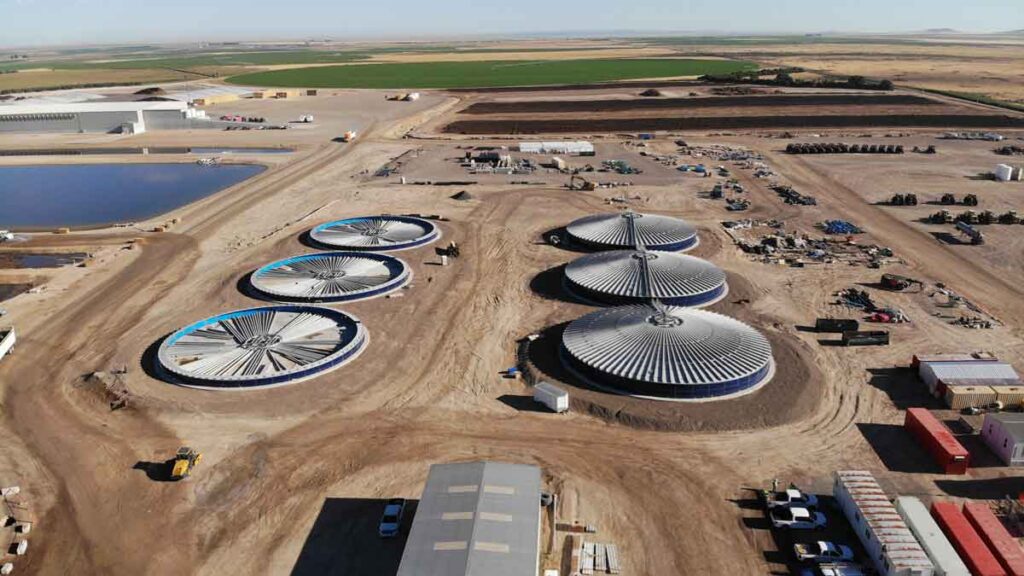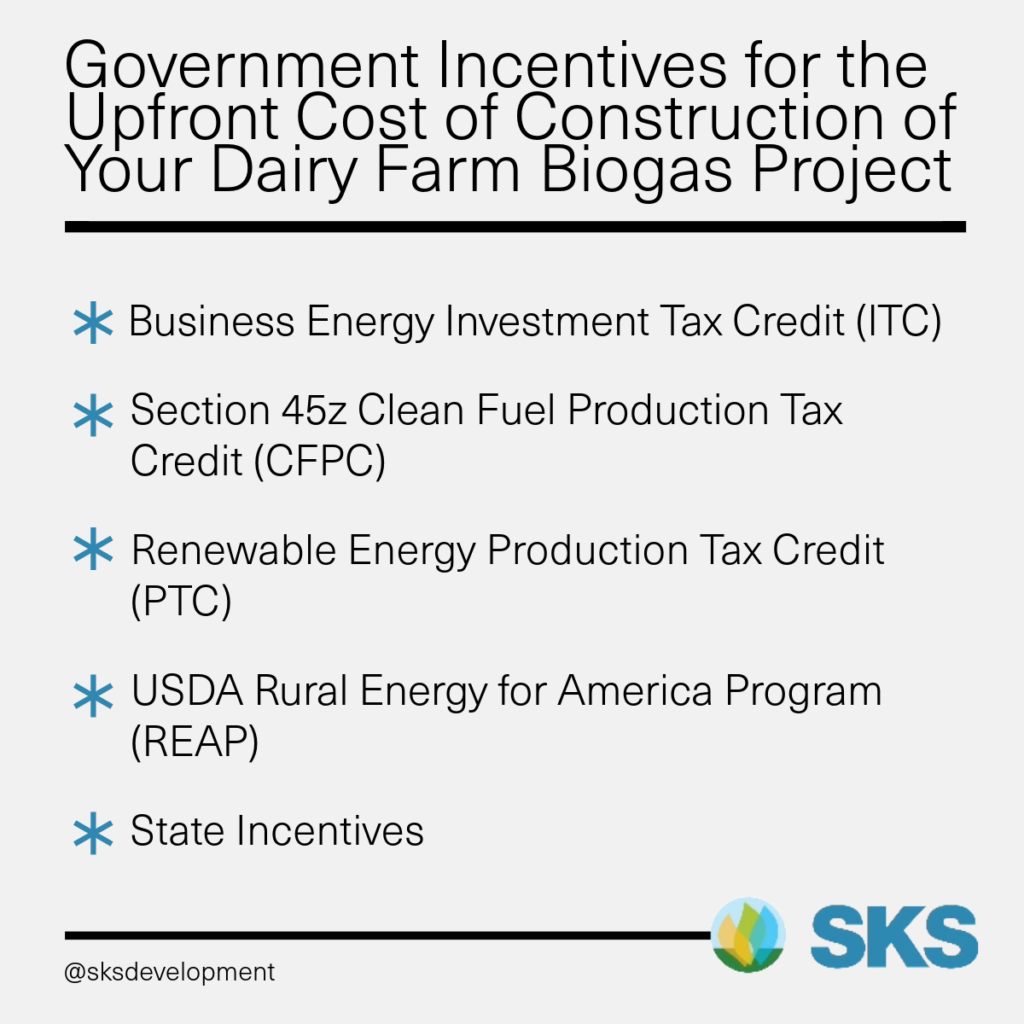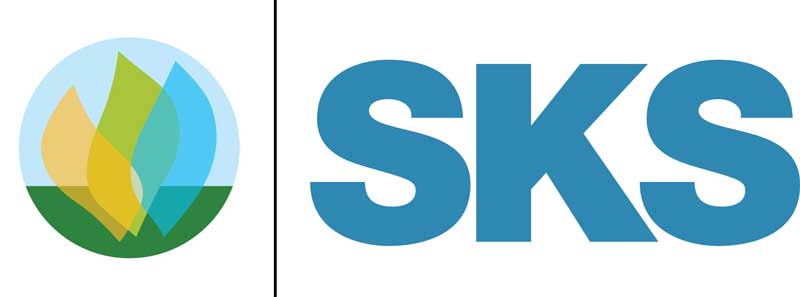Biogas is a renewable energy source that can be produced from organic waste, such as manure and food scraps. Biogas can be used to generate heat and electricity and power vehicles.
Biogas projects provide a variety of economic, environmental, and energy benefits for dairy farms. However, the upfront costs of building a biogas digester can be significant.
To help offset these costs, dairy farmers can take advantage of a number of government incentives. This guide provides an overview of the different types of government incentives available for the construction of biogas projects and how to find the right incentives for your project.

Federal and State Incentives for Biogas Projects on Dairy Farms
There are a variety of government incentives available to help dairy owners and managers finance their biogas projects. These incentives vary by state and federal programs, but they can include grants, loans, tax credits, and rebates.
Federal incentives
Business Energy Investment Tax Credit (ITC)
The Business Energy Investment Tax Credit (ITC) is a federal tax credit that can be used to offset the cost of installing certain renewable energy facilities and energy-efficient equipment. With the passage of the Inflation Reduction Act in 2023, biogas digesters are now eligible for the ITC. For projects that begin construction before 2025, the ITC starts at 6% for biogas projects, with a 5x multiplier for satisfying the prevailing wage and apprenticeship requirements. Additional 10% bonuses are available for satisfying domestic content requirements, and/or being located in either an energy community or a low-income community. In total, the ITC can be as much as 60% of the biogas project’s eligible basis.
Section 45z Clean Fuel Production Tax Credit (CFPC)
The Section 45z Clean Fuel Production Tax Credit (CFPC) is a federal tax credit for the production of transportation fuels with lower greenhouse gas emissions than conventional fuels. The CFPC is available for a variety of clean fuels, including biogas.
The CFPC is structured as a sliding scale, so producers of fuels with lower greenhouse gas emissions receive larger credits. Biogas has a much lower greenhouse gas emissions intensity than conventional gasoline or diesel, so dairy farmers who produce biomethane from their biogas digesters can potentially qualify for a high CFPC.
Renewable Energy Production Tax Credit (PTC)
The Renewable Energy Production Tax Credit (PTC) is a federal tax credit available for projects that generate renewable electricity. The PTC is based on the amount of renewable electricity produced by the system.
The PTC rate is $0.027 per kilowatt-hour (kWh) for projects under 1 megawatt of alternating current (MWac) and $0.021/kWh for projects over 1 MWac. The PTC rate fluctuates annually based on inflation, and the credit lasts for 10 years after the project is placed in service.
USDA Rural Energy for America Program (REAP)
The Rural Energy for America Program (REAP) provides guaranteed loan financing and grant funding to support the development of renewable energy projects in rural areas. Dairy farmers can use REAP funds to help finance the installation of anaerobic digestion systems on their farms.
REAP funding options include:
- Loan guarantees on loans up to 75 percent of total eligible project costs
- Grants for up to 50 percent of total eligible project costs
- Combined grant and loan guarantee funding up to 75 percent of total eligible project costs
State incentives
In addition to the federal incentives listed above, many states also offer incentives for biogas projects such as tax credits and rebates for biogas. You can explore policies and incentives for renewables and efficiency by state at Database of State Incentives for Renewables & Efficiency.

How to Find the Right Government Incentives for Your Biogas Project
There are a number of ways to find the right government incentives for your biogas project. One of the best places to start is with the Database of State Incentives for Renewables and Efficiency (DSIRE). DSIRE is a comprehensive database of financial and policy incentives for renewable energy and energy efficiency technologies at all levels of government, including federal, state, local, and tribal.
You can also contact your state energy office or local economic development agency for assistance. These organizations can provide information on specific incentives that may be available in your area.
Additional resources are available at:
- USDA Energy Matrix
- USDA Natural Resources Conservation Service
- USDA Rural Energy for America Program
- USDA Rural Development Business Programs
- USDA Rural Development Value-Added Producer Grants (VAPG)
- AgSTAR Vendor Directory
- AgSTAR Webinar: Federal Financing Resources for Anaerobic Digesters
- AgSTAR Funding On-Farm Anaerobic Digestion
- Sustainable Agriculture Research & Education Grants (SARE)
How to Navigate Eligibility Criteria for Government Methane Digester Incentives
To qualify for government incentives for methane digester projects, dairy farmers must typically meet certain eligibility criteria. Most programs require that you submit a project proposal and demonstrate that your project will meet certain technical and financial requirements.
The eligibility requirements for government incentives vary by program. For example, the federal ITC and PTC have specific requirements for the size and type of methane digester that is eligible for the tax credit. State incentives also have their own eligibility criteria.
While the eligibility requirements for government incentives vary by program, there are a few things you can do to maximize your chances of receiving the most benefits:
- Plan ahead: The earlier you start planning your project, the more time you will have to identify and apply for all relevant incentives. This will also give you time to work with your biogas provider to structure your project in a way that maximizes your eligibility for incentives.
- Stack incentives: In many cases, you can stack government incentives with other financial incentives, such as grants and loans from private lenders. This can help you reduce the overall cost of your project and make it more financially feasible.
- Make sure you meet all of the eligibility requirements: Carefully review the eligibility requirements for each incentive you are applying for. Make sure you meet all of the requirements before investing time and money in completing an application.
- Provide complete and accurate information: Be sure to provide complete and accurate information on your incentive applications to avoid delaying or even disqualifying your application.
- Work with a qualified accountant: The guidance of a qualified accountant is imperative for helping you navigate the complex tax and accounting implications of government incentives. They can also help you ensure that you are maximizing your benefits.
Reap the Financial Benefits of Biogas
Government incentives can play a major role in helping dairy farmers and managers finance their biogas projects. By carefully planning their project and working with a qualified biogas developer, dairy farmers can maximize their government incentives and make their biogas project more affordable and financially feasible.
SKS Development’s team of engineers, project managers, and investment professionals have the know-how to build the right facility for your needs while leveraging federal and state incentive programs that drive system profitability and investment returns.
To learn more about how you can reduce the upfront costs of your project, please reach out to the SKS team. We would be happy to answer your questions.
Disclaimer: This information is provided by SKS Development LLC for educational purposes only and does not constitute tax or investment advice. Please consult with a qualified tax advisor or investment professional to discuss your specific circumstances. This information was last updated in November 2023 and government incentives may have changed.
